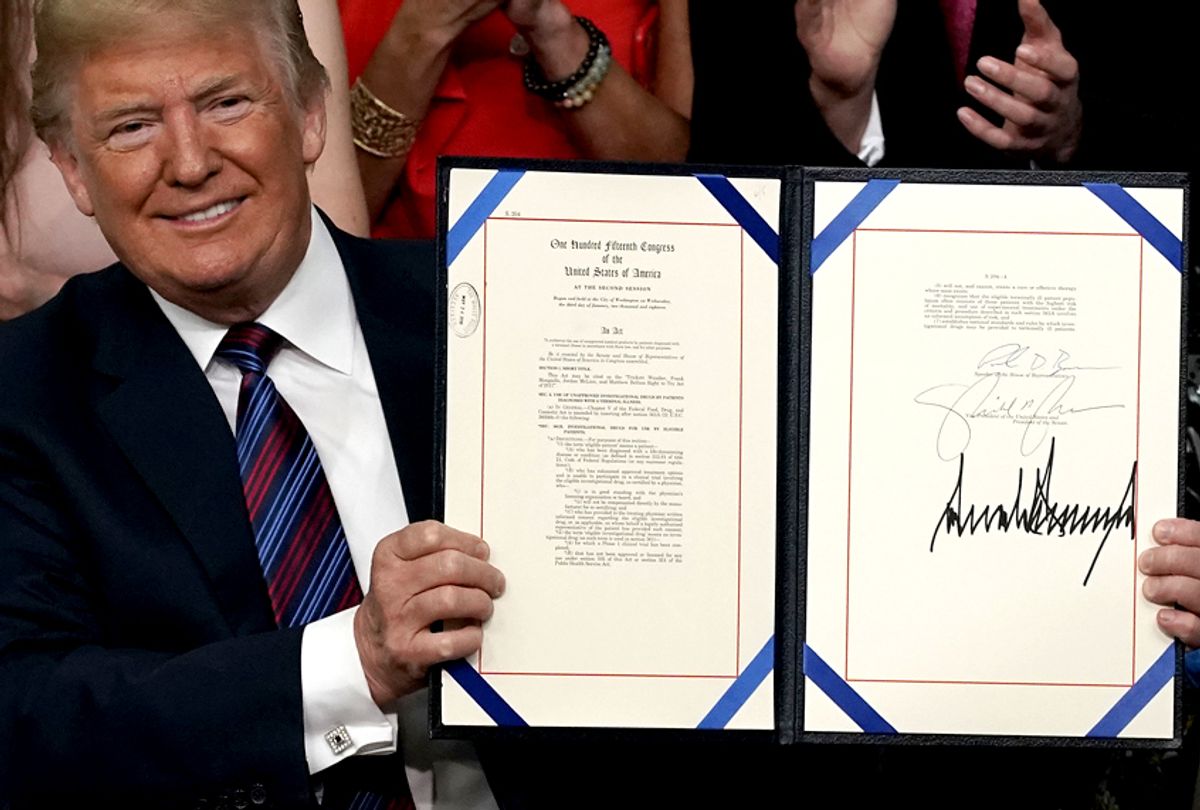Like a toddler wielding a set of Crayola markers, Donald Trump is pen-happy — and he's been signing bills into law just because. On Wednesday, the tweeter-in-chief signed the “Right to Try” law, which would allow terminally ill patients to have access to experimental drugs that have yet to receive a full stamp of approval by the Food and Drug Administration.
During his signing ceremony, he boasted how the law will save thousands of lives, a statement that seems not to be grounded in any fact or study.
“We will be saving — I don’t even want to say thousands, because I think it’s going to be much more — thousands and thousands, hundreds of thousands. We’re going to be saving tremendous numbers of lives,” Trump said. “And it’s so great that you’re up here with us and that we’re all on this front line together.”
Whether or not this act will save that many lives is unclear. A similar program, “Expanded Access (Compassionate Use)” has been in effect since the 1970s. The FDA says on program’s website page it authorizes “over 99% of expanded access requests it receives.” Treatment, according to the site, may begin 30 days after it receives an investigational new drug application.
The law Trump signed on Wednesday allows patients to request access directly from drug companies, rather than waiting for approval by the FDA. When the legislation was mentioned in Trump’s 2018 State of the Union Address, the American Cancer Society Cancer Action Network (ACS CAN), and nearly 40 additional patient organizations, penned a letter to House Speaker Paul Ryan opposing the legislation.
“Our organizations support patient access to unapproved therapies,” the letter stated. “However, the Right to Try bills currently under consideration in the House do not effectuate policy changes that would afford our patients greater access to promising investigational therapies.”
The letter added that generally, when request for a treatment is denied, it comes from the company.
“When access to a therapy is denied to a patient, it is generally the company that denies the request, and for reasons that appear to be reasonable, such as a determination that the benefits do not outweigh the risks, an unavailability of sufficient product to offer outside of clinical trials, costs, or concerns about adversely affecting clinical trial enrollment,” the letter stated.
Americans for Prosperity, an organization funded by David H. Koch and Charles Koch had been advocating for the bill to pass since January.
“Easing the regulatory burden on terminally ill patients and their families is a commonsense and a bipartisan proposal, which is why more than 38 states have approved their own version of Right to Try laws, many with unanimous support of state legislatures,” the organization wrote to The Honorable Greg Walden Chairman of the House Energy and Commerce Committee in January. “Still, federal legislation is needed to ensure that the FDA, or any other federal agency, not interfere with the implementation of state-passed laws.”
However, a policy report from Rice University said these laws have not proven to increase access, but instead have possibly created a false expectation.
“The laws can also create an expectation of access when, in fact, obtaining the drugs from the pharmaceutical companies is often more difficult than getting expanded access approved by the FDA,” the author wrote.



Shares